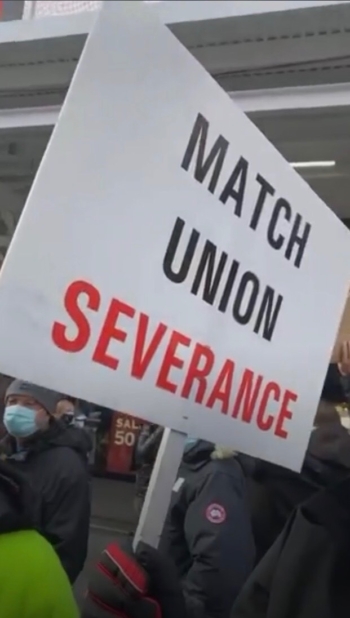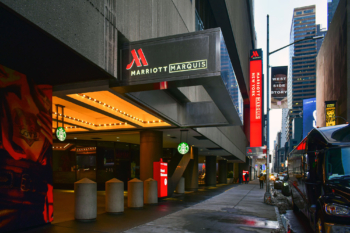850 Workers Fired at Non-union Marriott Marquis in Times Square


December 23, 2020 11:19 AM
On December 11th, the Marriott Marquis, the largest non-union hotel in New York City, terminated over 850 employees, most after many years of service with the hotel. Most of them will be replaced by subcontracted workers.
For decades, the employees of that hotel were paid more and got better benefits than any other non-union Marriott employees. Many of the workers at the Marquis assumed this would last forever, and that they didn’t need the protection of a union contract. In fact, their special favored position within Marriott relied entirely on the Company’s union-avoidance strategy to keep HTC from organizing the shop. For 35 years, Marriott used its renowned marketing talents to make many of the Marquis workers believe the Company was matching or exceeding union wages and benefits. Marriott paid a few pennies more on workers’ base hourly wage, but thousands of dollars per year less by not paying all the extra wage items HTC members get (like time and a quarter pay when they work less than a full work week). The Company also saved millions by short-changing employees on benefits.
Last week’s mass termination signaled that Marriott now has a new strategy, calculated to dramatically lower labor costs and boost profits by subcontracting out the work of the hundreds of employees in Food and Beverage (and no longer being their employer).
Too late for our Union to help the fired Marquis workers
So far, the terminations at the New York Marriott Marquis have been limited to the Food and Beverage departments and employees with lower seniority (although what this meant for Room Attendants was terminations of individuals with as many as 19 years of service). The terminations represent what we estimate to be more than two-thirds of the non-management workforce.
Obviously, this is a uniquely hard time for 850 hotel workers in New York to be permanently let go. The terminated workers are trying to persuade the company to pay out higher severance pay than initially announced. Unfortunately, because the Marquis workers are not covered by our Union’s Industry-Wide contract, they were not entitled to the protections against subcontracting or severance benefits we have negotiated. And because the Union does not represent them, we cannot negotiate on their behalf.
Fortunately, we did recently win recognition as the collective bargaining representative of the workers at the Marriott Downtown, which was non-union for almost as long as the Marquis. Our Union expects to obtain the same job security provisions we have in all our contracts in negotiations for the Marriott Downtown’s first union contract.
The union difference: job security
Business in the New York City hotel industry has been devastated by the Coronavirus. There have been over 150 temporary hotel closures and roughly 80% of our Union’s membership has been laid off due to the crisis. However, what happened at the Marriott Marquis is dramatically different from the layoffs and temporary closures happening at union hotels.
Layoffs in the non-union industry
Our members know that unless a hotel or department permanently closes, the words “laid off” mean something different from the word “fired” in an HTC-represented hotel or casino. Under our contracts, a laid off worker is not fired and they never lose their right to be recalled to the job. Layoffs are done by inverse seniority. Laid off workers have the right to be recalled, by seniority. Managers can’t do the work of laid off employees, and there are many other contractual protections to ensure that layoffs are not abusive.
But out in the non-union world, being laid off is the same thing as being fired.
Non-union hotel workers are “at will”
The Marquis workers, like all non-union hotel workers, are “at will” employees. This means that the company has the right to fire its employees at any time and it is perfectly legal for such “at will” employees to be fired, or otherwise disciplined, unjustly, for almost any reason or even for no reason at all. It is quite common for non-union employers to permanently lay off workers (i.e. fire them) even for temporary reductions in business. It is an opportunity to get rid of long-term employees who cost more than new employees. Marriott has been using the COVID-19 pandemic as an excuse to permanently lay off non-union employees across the country.
By contrast, workers represented by our Union can only be fired or disciplined if an employer has “just cause” to do so. All of our contracts provide that the Union has the right to challenge in arbitration whether an employee’s discharge or discipline was for “just cause.” This means that the employer has to be able to prove, to an impartial arbitrator, and through a fair process, that the employee deserved to be fired or disciplined.
Job security in HTC contracts goes way beyond “just cause”
For decades, our Union has consistently fought for and negotiated formidable provisions in our contracts that protect our members’ job security and we are constantly repairing and enhancing those defenses as employers invent new gimmicks to cut labor costs. In fact, our Union has the strongest such protections of any union in the hotel and gaming industries. Our master contracts (the IWA, the Division A and the GRIWA) prevent employers from outsourcing our work like Marriott did at the Marquis and guarantee our jobs and contracts in the event a union hotel is sold or changes management companies.
As a result, today the workers we represent have the most secure hotel jobs in the country. While these contractual rights have played an important role in protecting our members as the industry has evolved in recent years, no one could have imagined just how critical these protections would be in the face of a global pandemic.
A handful of the most important contractual protections in our master contracts include:
Protecting bargaining unit work: In each of our master contracts, hotels are prohibited from laying off union workers by outsourcing bargaining unit (union) work or assigning our work to managers or non-union employees. This contract language has prohibited hotels from eliminating daily room cleans during COVID-19, cutting hours by assigning union work to managers, or assigning extra rooms or overtime to employees while other workers in that classification are laid off.
Successors and assigns: Our master contracts protect the workers we represent in the event a hotel is sold or changes management companies. As a condition of the sale (or change in management), the new owner or management company is required to keep all of the union workers, sign our Union’s contract, and keep all of the union workers’ wages and benefits intact.
Prior to the pandemic, a union hotel in New York City changed hands roughly every 2 weeks. As the shockwaves of COVID-19 pandemic continue to ripple through the hotel industry and hotels encounter financial problems, we expect this to accelerate.
Layoffs and recall rights: Our master contracts have unlimited recall rights. No matter how long it takes the hospitality and gaming industries to reopen and our work to return, workers represented by our Union have a contractual right to be recalled to work in order of seniority.
In contrast, hotel workers across our country – including those represented by other unions – have no legal right to return to work when the pandemic ends. Nowhere else in the country are workers as protected as those covered by an HTC contract.
When this crisis ends, HTC workers will return to their jobs
Throughout the pandemic, our Union has made every possible effort to make sure union workers who remained on the job were safe and protected from contracting COVID-19 and to support laid off workers by winning emergency healthcare coverage and over $500 million in severance pay to supplement unemployment benefits.
HTC President Rich Maroko explains that workers represented by HTC do not need to worry about their right to return to their jobs. “As challenging as this crisis has been for our 40,000 members and their families, the workers we represent can rest assured that when tourism comes back to New York City, they will have the legal right to go back to their jobs.”


